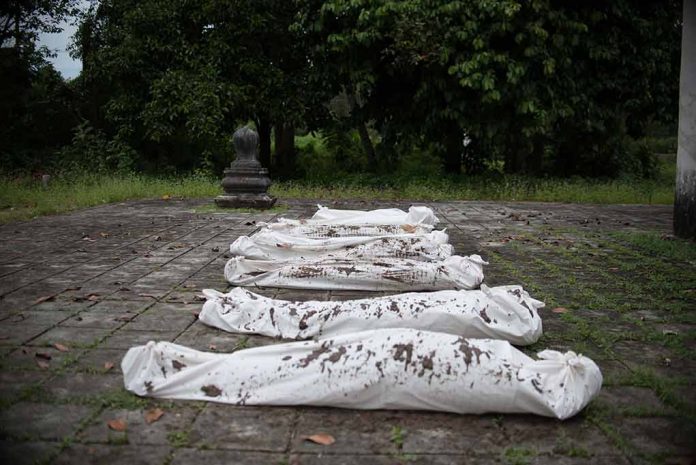
A devastating gasoline tanker explosion in Niger state, Nigeria, claims 86 lives and injures 55, highlighting the dire consequences of the country’s fuel crisis.
Key Takeaways
- A gasoline tanker explosion in Niger state, Nigeria, resulted in 86 deaths and 55 injuries.
- The disaster occurred when an attempt to transfer fuel from a toppled tanker using a generator caused an explosion.
- The incident reflects the consequences of skyrocketing fuel prices due to recent subsidy eliminations by President Bola Tinubu’s administration.
- Similar incidents have resulted in over 265 deaths in the past five months, emphasizing the urgent need for safety measures.
- President Tinubu has called for a national awareness campaign on the dangers of collecting fuel from fallen tankers.
Tragic Explosion Near Suleja
On a fateful day near Suleja in north-central Nigeria, a gasoline tanker carrying 60,000 liters of fuel overturned at Dikko Junction, setting the stage for a catastrophic event. The aftermath of this incident has left the nation in shock, with 86 confirmed deaths and 55 individuals injured. The explosion occurred on a road linking Abuja to Kaduna, a route frequently used by commercial vehicles and fuel transporters.
Ibrahim Audu Husseini, spokesman for Niger state’s emergency management agency, provided a grim update on the situation. “We buried 86 burnt corpses between 12:00 pm yesterday to 2:00 am of today,” he stated, underscoring the magnitude of the tragedy.
Fuel Crisis and Desperate Measures
The explosion highlights the desperate measures some Nigerians are taking to obtain fuel amidst a national crisis. Following President Bola Tinubu’s economic reforms, which included the abolition of fuel subsidies and the end of currency controls, Nigeria has experienced soaring inflation and significant increases in petrol prices. These changes have pushed many citizens to resort to dangerous methods of acquiring fuel, including siphoning from overturned tankers.
“There were people that were burnt to ashes. How can we get that figure?” said Hussaini Isah, emphasizing the difficulty in determining the exact death toll. “We won’t know the exact figure without forensics.”
The incident occurred when a large crowd gathered at the scene, with some attempting to scoop gasoline from the toppled tanker. In a tragic turn of events, an attempt to transfer the fuel using a generator sparked the devastating explosion, claiming the lives of those directly involved and many bystanders.
Nigerian gasoline tanker explosion death toll rises to 86, with 55 others injured https://t.co/zSKIa0eCAh
— WKRN News 2 (@WKRN) January 19, 2025
Government Response and International Condolences
President Tinubu expressed deep sorrow over the incident, recognizing its tragic and preventable nature. His office released a statement calling for a national awareness campaign on the dangers of collecting fuel from fallen tankers, aiming to prevent future occurrences of such disasters.
“We are deeply saddened by the loss of lives due to the fuel tanker explosion that occurred yesterday in the Gurara Local Government Area of Nigeria,” said Türkiye’s Foreign Ministry in a statement, extending condolences to the Nigerian people.
The international community has taken notice of this tragedy, with countries like Türkiye offering their sympathies. This global attention underscores the severity of the situation and the need for comprehensive solutions to address Nigeria’s fuel crisis and road safety issues.
The blast happened in the early hours of Saturday near the Suleja area of Niger state after individuals attempted to transfer gasoline from a crashed oil tanker into another truck using a generator. https://t.co/bURfy9c9Ym
— Stars and Stripes (@starsandstripes) January 19, 2025
A Pattern of Tragedy
Alarmingly, this incident is not isolated. Similar explosions have claimed over 265 lives in the past five months alone, pointing to a dangerous pattern. The combination of poorly maintained roads, economic pressures, and desperate fuel-seeking behavior has created a perfect storm for such tragedies.
In 2020, Nigeria reported 1,531 fuel tanker accidents, highlighting the ongoing safety concerns in the country’s transportation sector. The recent explosion near Suleja serves as a stark reminder of the urgent need for improved road infrastructure, stricter safety regulations, and comprehensive public education on the dangers of fuel siphoning.
As Nigeria grapples with the aftermath of this tragedy, the incident serves as a call to action for both the government and citizens. It underscores the critical need for sustainable solutions to the country’s fuel crisis and the importance of prioritizing public safety in the face of economic challenges.
Sources:
- Türkiye offers its condolences to Nigeria over fuel tanker truck blast
- At least 86 dead, 55 injured in Nigerian gasoline tanker explosion
- At least 86 dead, 55 injured in Nigerian gasoline tanker explosion – DNyuz














